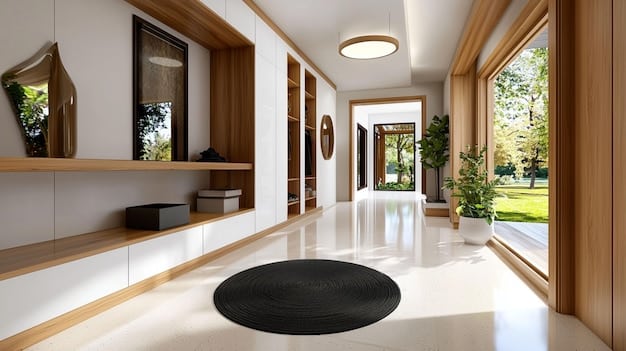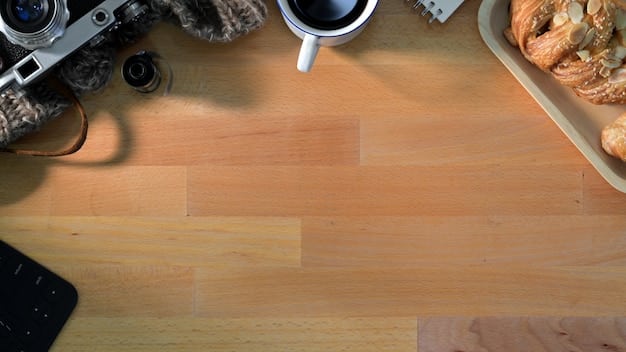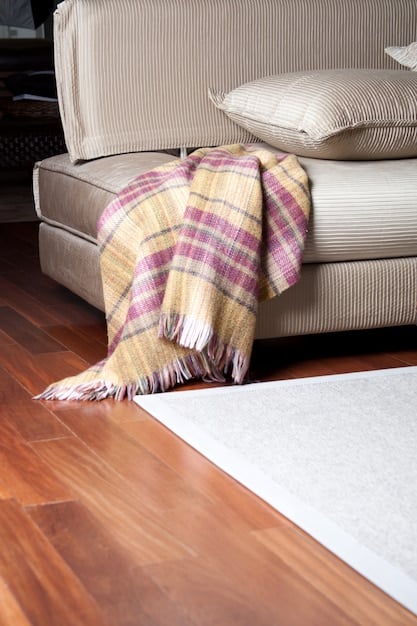Best Flooring for High-Traffic Areas: Durability & Style

Advertisements
Discover the best flooring options for high-traffic areas that combine durability with stylish designs, ensuring long-lasting beauty and functionality for your home.
Choosing the right flooring for areas in your home that see a lot of foot traffic can be a challenge. You need something that can withstand wear and tear, but you also want it to look good. Let’s explore the best flooring options for high-traffic areas: durability and style combined.
Advertisements
Understanding the Demands of High-Traffic Areas
High-traffic areas such as hallways, kitchens, and entryways require flooring solutions that go beyond mere aesthetics. These spaces endure constant foot traffic, potential spills, and the impact of everyday activities. Therefore, understanding the specific demands is vital before selecting a suitable flooring material.
Factors Contributing to Wear and Tear
Several factors can exacerbate wear and tear in high-traffic zones. Understanding these elements will help you prioritize the necessary characteristics in your flooring selection.
Advertisements
- Foot Traffic: The sheer volume of people walking across the floor daily contributes significantly to surface abrasion.
- Moisture Exposure: Entryways and kitchens are prone to spills and moisture, which can damage certain flooring types over time.
- Impact Resistance: The potential for dropped items and heavy furniture necessitates materials that can withstand impact without denting, scratching, or cracking.
- Cleanability: Easy maintenance is essential to prevent the buildup of dirt and grime, which can further degrade the appearance and longevity of the floor.
Ultimately, the best flooring choice for high-traffic areas balances durability, style, and ease of maintenance to ensure lasting performance and visual appeal.

Top Flooring Choices for High-Traffic Zones
Selecting the right flooring for high-traffic zones means balancing durability, style, and ease of maintenance. Several materials stand out due to their ability to withstand heavy use while maintaining an attractive appearance.
Tile Flooring: An Excellent Choice
Tile flooring is often regarded as the gold standard for high-traffic areas due to its exceptional durability and diverse design options. Porcelain and ceramic tiles are particularly well-suited for busy spaces.
Porcelain tile is incredibly dense and resistant to scratches, stains, and water damage. Its robustness makes it ideal for entryways, kitchens, and hallways. Ceramic tile, while slightly less dense than porcelain, still offers significant durability and stylish versatility at a more budget-friendly price point.
Luxury Vinyl: Style Meets Resilience
Luxury vinyl plank (LVP) and luxury vinyl tile (LVT) are gaining popularity as excellent flooring options for high-traffic areas. Designed to mimic the look of natural materials like wood or stone, luxury vinyl offers a balance of aesthetics and performance.
- Durability: High-quality luxury vinyl is engineered with a wear layer that resists scratches, scuffs, and stains.
- Water Resistance: Ideal for moisture-prone areas, luxury vinyl prevents water damage, making it suitable for kitchens and bathrooms.
- Comfort: Softer underfoot than tile, luxury vinyl provides added comfort, reducing fatigue in areas where you stand for extended periods.
Whether you prefer the look of hardwood or the elegance of stone, luxury vinyl provides a practical and stylish solution for high-traffic areas.
Exploring the Benefits of Hardwood and Laminate
While hardwood and laminate flooring offer aesthetic appeal, their suitability for high-traffic areas requires careful consideration. Understanding their pros and cons will help you make an informed decision based on your needs and lifestyle.
Hardwood Flooring: Classic Elegance
Hardwood flooring brings warmth and elegance to any space. However, its susceptibility to scratches, dents, and water damage makes it less ideal for high-traffic zones unless properly maintained. Opting for harder wood species like oak or maple can improve its durability.
Laminate Flooring: Budget-Friendly Alternative
Laminate flooring is a cost-effective alternative that mimics the look of hardwood. Newer laminate options are more durable and water-resistant than their predecessors. Laminate’s wear layer helps protect against scratches and fading, making it suitable for moderate-traffic areas.
However, it’s important to note that laminate is not as resilient as tile or luxury vinyl and may require more frequent replacement in very high-traffic zones.

Prioritizing Maintenance and Upkeep
Regardless of the flooring material you choose, proper maintenance and upkeep are vital for preserving its appearance and longevity. Regular cleaning and preventative measures will help extend the life of your floors and maintain their beauty.
Daily Cleaning Practices
Implementing simple daily cleaning habits can significantly reduce the impact of high foot traffic and potential spills.
- Regular Sweeping or Vacuuming: Remove dirt, dust, and debris regularly to prevent scratching and abrasion from everyday use.
- Spot Cleaning: Address spills immediately to prevent staining and water damage. Use appropriate cleaning solutions recommended by the flooring manufacturer.
- Doormats and Rugs: Place doormats at entrances to trap dirt and moisture before they reach your flooring. Use rugs in high-traffic areas to provide an extra layer of protection.
By adopting these cleaning practices, you can minimize the wear and tear on your floors and keep them looking their best for years to come.
Balancing Style and Functionality
When selecting flooring for high-traffic areas, balancing style and functionality is essential. The right flooring choice should not only withstand heavy use but also complement your home’s overall aesthetic.
Selecting the Right Colors and Patterns
The choice of colors and patterns can significantly impact the appearance and perceived cleanliness of your floors.
Darker colors tend to hide dirt and stains more effectively than lighter shades, making them a practical choice for busy areas. Alternatively, patterns and textures can help camouflage minor imperfections and wear marks.
Texture and Slip Resistance
Texture and slip resistance are crucial considerations for safety, especially in areas prone to moisture. Textured surfaces provide better traction, reducing the risk of falls in entryways, kitchens, and bathrooms.
Ultimately, the best approach is to combine a visually appealing design with practical features that enhance the durability and safety of your flooring.
Understanding Costs and Installation
Understanding the costs and installation requirements associated with different flooring options is an important aspect of the decision-making process. Budget considerations and installation complexities can influence your choice.
Initial Costs and Long-Term Value
While some flooring materials may have a higher upfront cost, their long-term value often outweighs the initial investment. Durable materials like tile or high-quality luxury vinyl may require less frequent replacement compared to cheaper alternatives.
Professional vs. DIY Installation
The decision to hire a professional installer or tackle the project yourself depends on your skills, experience, and the complexity of the installation. Professional installation ensures proper execution and can prevent costly mistakes. However, DIY installation can save on labor costs if you are comfortable with the process.
Carefully weigh the pros and cons of each option to determine the best approach for your specific needs and budget.
| Key Point | Brief Description |
|---|---|
| 💪Durability | Choose resilient materials like tile or luxury vinyl for high foot traffic. |
| 💧Water Resistance | Opt for water-resistant flooring in kitchens and entryways to prevent damage. |
| 🧹Maintenance | Regular cleaning and preventative measures are key to preserving flooring. |
| 🎨Style | Balance functionality with aesthetics by choosing the right colors and patterns. |
Frequently Asked Questions (FAQs)
▼
Tile, especially porcelain, and luxury vinyl plank (LVP) are excellent choices due to their durability and resistance to wear and tear. They also offer a variety of styles to match your home decor.
▼
Use rugs and mats in high-traffic zones to minimize scratches and dents. Apply a protective coating and regularly clean to prevent dirt buildup. Consider harder wood species like oak or maple.
▼
Laminate can be suitable, but ensure it’s water-resistant to handle spills. Opt for higher-quality laminate with a durable wear layer. Regular cleaning and immediate spill cleanup are crucial.
▼
Sweep or vacuum daily to remove dirt and debris. Spot clean spills immediately. Deep clean weekly or bi-weekly, depending on the level of traffic. Use appropriate cleaning solutions for your flooring type.
▼
Consider both initial costs and long-term maintenance. Durable materials like tile may have higher upfront costs but require less frequent replacement. Factor in cleaning supplies and potential repair expenses.
Conclusion
Selecting the right flooring for high-traffic areas involves balancing durability, style, and maintenance. By carefully considering the demands of these spaces and exploring various flooring materials, you can create beautiful and resilient floors that enhance your home’s functionality and aesthetic appeal.